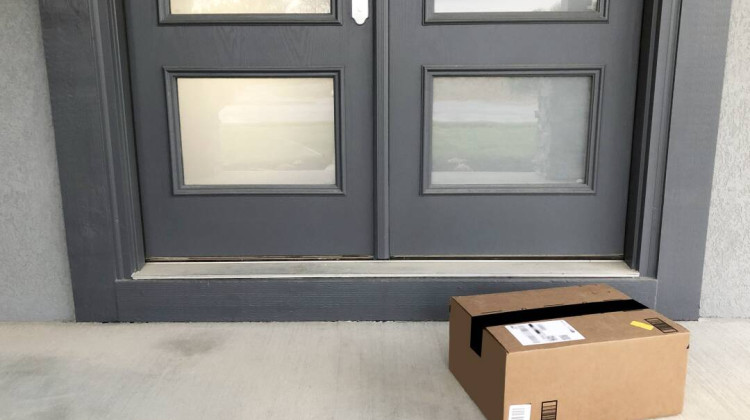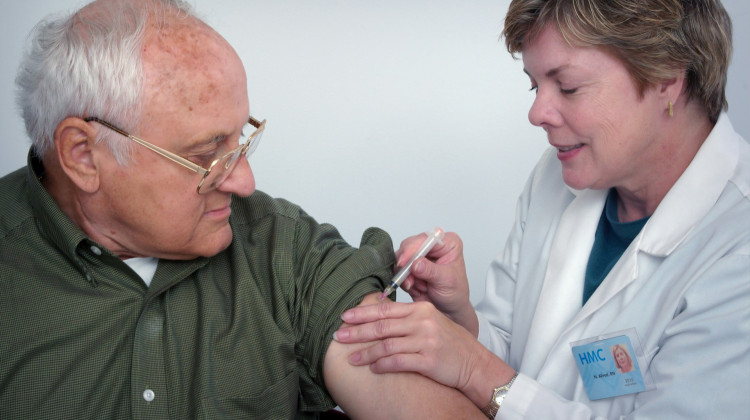
An IUPUI lab expert screens a water sample for lead.
(John Shukle for IUPUI Center for Urban Health/Submitted photo)IUPUI’s Center for Urban Health will distribute dozens of free lead screening kits at the Indiana Black Expo health fair this week to help overcome barriers many families with children face to get their houses tested.
The do-it-yourself kits are anonymous and can be used to screen for lead at home by collecting dust, water and soil samples. The lab results are performed by IUPUI experts at no cost. The kits will be handed out on a first-come-first-serve basis Friday through Sunday at the Indiana Black Expo health fair.
Hundreds of Hoosier families may be exposed to lead at home through yard soil, tap water and house paints.
Families living in lower-income neighborhoods and older houses are at the highest risk of lead exposure and poisoning. That’s because lower-income urban neighborhoods are home to much industrial legacy pollution, homes tend to be older and less maintained, families have less access to routine health checkups and children receive less nutritious diets making their body more susceptible to lead poisoning.
“The concern would be that, especially with lower level lead exposure, kids won't necessarily have noticeable symptoms. And so, that's why blood lead screening is done,” said Dr. Blake Froberg, a pediatrician at Riley Children’s Hospital and director of the Indiana Poison Center.
For young children, exposure to lead can cause damage to their immune and nervous system and a decline in their IQ leading to potentially lifelong setbacks.
Parents may not suspect their child is at risk from lead in drinking water, soil and house paints. But the continuous, silent exposure can accumulate, leading to health problems and even lead poisoning, Froberg said.
“That's tens of thousands of families who might not have any awareness or understanding that their child was exposed to lead. And so therefore, they haven't done anything to solve the problem,” said IUPUI Environmental Resilience Institute Executive Director Gabriel Filippelli, who is leading the free lead screening kits project.
Beside routine blood tests for lead, one important intervention Filippelli and other health experts suggest is preemptively testing the house paint, water and soil for potential lead exposure sources if a family suspects they may be at risk.
But many families are not even aware of lead and its dangers. First Baptist Church North Pastor Ivan Douglas Hicks said he sees this awareness gap in his congregation and the surrounding community. Hicks and other ministers around the city have formed the Indianapolis Ministerium and are coordinating efforts to raise awareness and address some of the other barriers to lead tests.
“They do not want Child Protective Services, they do not want the health department to be intrusive and to levy fines,” Hicks said. “And they think their children would be taken away if they were discovered to have lead.”
Some families also cannot afford to have their house tested for lead –– the process can cost up to $300.
The anonymous and free lead screening kits developed by Filipelli’s team and distributed by community partners provide one way to tackle these barriers.
The data collected through the tests will be mapped through an interactive tool called Map My Environment that Filipelli and his team developed in the hope that the more granular lead data is available, the better targeted remediation and surveillance programs can be.
In Indiana, such efforts are crucial to protect children when some regulations fail to do so.
The state’s threshold for action is a blood lead level of 10 micrograms per deciliter (μg/dL) –– double the CDC’s recommendations. This means that only children who have elevated blood levels as high as 10 μg/dL can receive case management and crucial health support from the state.
Considering that lower-income families are the most at risk for lead poisoning, this leaves a big number of children in “a gray area or a middle ground” as Filipelli describes, with limited ability to seek necessary support.
In a statement via email, an Indiana Department of Health representative said the department is holding on-going discussions about the resources needed to lower the state’s threshold to 5 μg/dL.
“Many of [the] 94 local health departments have very small staff, while others are better resourced. This, in turn, can impact their ability to take on additional caseloads,” the ISDH statement said. “We have formed a lead advisory committee that includes external stakeholders to discuss the issue; those discussions are focused largely on what resources would be needed to ensure that every child with a confirmed elevated blood lead level of 5 [μg/dL] receives case management.”
Until then, Hoosier families’ best bet is to ensure that their kids are not exposed to lead at home in the first place, and if they are, to remove the source promptly to stop the exposure and prevent it from causing further damage.
For questions about the lead screening kits, call 1-574-631-0486 or email lead@nd.edu. You can also visit www.leadscreeningkit.com for more information.
Contact reporter Farah Yousry at fyousry@wfyi.org. Follow on Twitter: @Farah_Yousrym.
 DONATE
DONATE






 View More Articles
View More Articles



 Support WFYI. We can't do it without you.
Support WFYI. We can't do it without you.